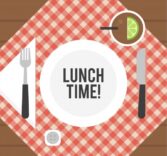Frases en Inglés / Español para padres y niños que te ayudarán en el día a día de la crianza bilingüe, aprovecha la rutuna de cada día para enseñar a tus hijos una segunda lengua. Toma unas cuantas frases, sino todas y úsalas cada día en casa. En esta ocasión aprendemos vocabulario Inglés/Español relacionado con el momento de comer y modales en la mesa.
Phrases in English / Spanish for parents and children to put into practice everyday. Take advantage of the daily routine to teach your children a second language. Take a few phrases, if not all of them, and use them every day at home. In this occasion we learn English/Spanish vocabulary related to lunch time and table manners.

| LUNCH TIME and TABLE MANNERS | HORA DE COMER y MODALES EN LA MESA |
| – Chew your food up well. | – Mastica la comida muy bien. |
| – Don’t speak with your mouth full. | – No hables con la boca llena. |
| – Be careful! You will get it all over yourself (yogurt). | – ¡Cuidado! Te lo vas a echar encima (yogur). |
| – You stained your t-shirt with tomato sauce. | – Te manchaste la camiseta con salsa de tomate. |
| – Hold the cup with two hands. | – Sujeta el vaso con las dos manos. |
| – Oh no! the cup slipped out of your hands. | – Oh no! El vaso se te escapó de las manos. |
| – Sit up straight. | – Siéntate recto. |
| – Let me push your chair in. | – Déjame acercarte a la mesa. |
| – It’s lunch time! Can you help me to set the table? | – ¡Es hora de comer! ¿Me ayudas a poner la mesa? |
| – Do you like it? Is it yummy/tasty? | – ¿Te gusta? ¿Está rico? |
| – Please stop banging the table with the spoon. | – Por favor, para de golpear la mesa con la cuchara. |
| – Well done! You finished it off. Your plate is spotless. | – ¡Muy bien! Te lo acabaste todo. Tu plato está impecable. |
| – Are you hungry? Would you like a snack? What about some fruit? | – ¿Tienes hambre? ¿Quieres un aperitivo? ¿Qué tal una fruta? |
| – Your tummy is rumbling! Lunch will be ready in no-time. | – ¡Te suenan las tripas! La comida estará lista en breve. |
| – It is not yucky, it is delicious. | – No está malo, es delicioso. |
| – Food is not disgusting. Please don’t be rude. | – La comida no es asquerosa. Por favor, no seas grosero/mal educado. |
| – Does your mash potatoes smell funny? | – ¿Tu puré de patatas huele raro? |
| – Let me taste it, you are right it is not ok. | – Déjame probarlo, tienes razón, no está bien. |
| – Come on don’t be picky, what would you like to eat tomorrow? | – Venga, no seas quejica, ¿qué te gustaría comer mañana? |
| – A treat? Maybe after lunch. Deal? | – ¿Un dulce? Quizás después de la comida. ¿De acuerdo? |
| – Today we are going to have leftovers. | – Hoy vamos a tomar sobras. |
| – Who wants mincemeat? | – ¿Quién quiere carne picada? |
| – Please stop dropping breadcrumbs. | – Por favor, deja de tirar migas. |
| – Let me get a plate/bowl for you. | – Déjame traerte un plato/cuenco. |
| – Would u like a little piece of cake? | – ¿Quieres un trozo de tarta? |
| – A bigger one? You are not supposed to eat that much. | – ¿Uno más grande? Se supone que no debes comer tanto. |
| – Can I have a tiny bit from yours? | – ¿Me das un poco del tuyo? |
| – We had enough; let’s put the rest of the biscuits in the biscuits tin. | – Tuvimos suficiente; vamos a poner el resto de galletas en la lata de galletas. |
| – Be careful this soft cake is very crumbly. | – Cuidado, este bizcocho se desmigaja mucho. |
| – If you keep dropping crumbs on purpose, you will soon have no more cake left. | – Si sigues tirando migas a propósito, pronto te quedarás sin bizcocho. |
| – There is only one piece of cake left. | – Solo queda un trozo de tarta. |
| – I will split them in two for you both. | – Los dividiré en dos para vosotros dos. |